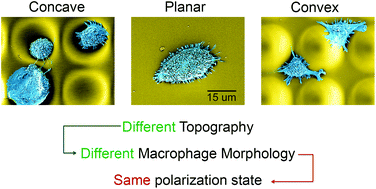Convex and concave micro-structured silicone controls the shape, but not the polarization state of human macrophages†
Abstract
The typical foreign body response (FBR) to synthetic implants is characterized by local inflammation and tissue fibrosis. Silicone implants have been associated with the development of adverse capsular contraction (ACC); a form of excessive FBR to the material that often requires the replacement of the implant. It has been shown that surface roughening of silicone can reduce the prevalence of ACC, but the mechanisms remain poorly understood. Macrophages are key cells in FBR. They exert their control mainly by polarizing into pro-inflammatory (M1) or pro-healing (M2) cells. It is postulated that surface topography can reduce M1 polarization by limiting cell spreading and cytoskeleton organization. To test this hypothesis, we used KrF Excimer laser ablation with half-tone masks to produce convex and concave topographies with controlled surface dimensional parameters. Cells in convex and concave topographies were compared to cells in planar surfaces, with or without chemical polarization. We show that chemical polarization induced specific changes in the cell shape on planar substrates. Macrophage shape and size was different in concave and convex surfaces, but no correlation was found with the cell polarization state. The results highlight that chemical polarization of macrophages is associated with changes in the cell shape; however, topography-induced changes in macrophage shape could not be linked with a shift in macrophage polarization. Thus, the sole manipulation of cell shape does not seem to be the mechanism by which macrophage function could be controlled.


 Please wait while we load your content...
Please wait while we load your content...